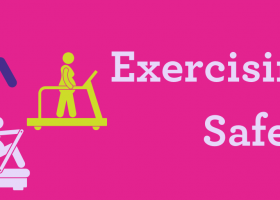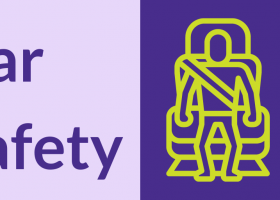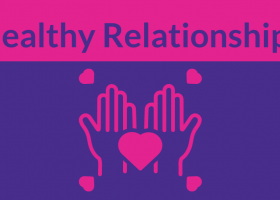Stressed?

Even for a superwoman like you, there are going to be times when you feel overwhelmed by life. Everyone has some stress in their life. What matters is how you respond to it. There are healthy and positive ways that you can deal with your feelings.
Signs of Stress
Stress looks different for everyone. Sometimes you might not even realize what you are feeling is a sign of stress. Stress that lasts for a long period of time can be harmful to the body and to a growing baby. It can make miscarriage, having an early delivery, or a baby with a low birth weight more likely.
By knowing some common signs of stress, you can be on the lookout for when the young woman in your life may have more than she can handle.
Physical Signs:
- Short, quick breaths
- Headaches
- Sweaty palms
- Change in appetite
- Problems sleeping
Mental Signs:
- Feeling afraid
- Feeling nervous
- Forgetting more often
- Feeling trapped or powerless
- Feeling anxious
Let her know that it’s okay to feel this way. It doesn’t mean that she is weak or can’t handle what’s on her plate. Stress is a normal part of life, and you’re there to help.
You Can Help
The young woman in your life may not always ask you for help or come to you when she needs it. With your experiences, you may know exactly what she needs. Think about what would have been helpful to you when you were raising your family or starting out on your own. Be there to help before she even asks.
Here are some ways that you can help her to deal with the stress that she may be feeling:
- Offer to watch the children. Give Mom some time off to just relax or get some other tasks done. Taking the kids off her hands for even a few hours can give her the time she needs to focus on herself and refresh.
- Listen. Sometimes your loved one just needs someone to talk to. Be there to listen and offer advice and guidance if she is open to it. Try not to lecture. Just listen and offer to help how you can.
- Run errands for her. With her busy schedule, the young woman in your life might not be able to get out of the house to get things done. Offer to pick up anything she needs such as food, household supplies, or other items. Next time you are going out for the things you need, call to see if she needs you to pick up anything too. It saves her a trip and you’re already out.
- Help plan meals. Imagine how nice it is to have a meal waiting for you at the end of a busy day. Pick up food or cook a meal for her family. She’ll appreciate the help. It’s one less thing that she needs to worry about.
- Help connect her to what she needs.
- Whether its food assistance, transportation, a church service, a new dance class, or the help of a doctor, help connect your young woman to someone who can help. If you aren’t sure, WIN Network: Detroit is here to help. Call us at 313-874-2187 and we can work together to get her the right kind of resources.
Effects of Long-Term Stress
When you feel stressed for a long period of time, it can affect you and your growing baby’s health.
- Your heart health. You are more likely to develop high blood pressure and heart disease.
- Your immune system. Serious or long-lasting stress can affect your immune system, which protects you from getting sick.
- Preterm and low birth weight. Your baby has a greater chance of being born too early or having a low birth weight.
- If your baby is born too early, it may not have enough time to completely develop all of their major organs, like their brain.
- A baby with low birth weight is more likely to have health problems. These include breathing and heart problems, problems with their intestines, or bleeding in their brain.
- Miscarriage. You are at a greater risk for having a miscarriage.
If you are feeling stressed, there are a lot of different strategies and activities that can help you to become more relaxed. For more information, check out “Dealing with Stress.”
Here are 4 tips to deal with your stress:
1. Mind your attitude
- Be flexible. If things don’t go as planned, try making new plans. Sometimes it’s not worth the stress to argue. If you’re in an argument, try to find something you both can agree on.
- Be organized. Plan your day. Writing to-do lists helps you figure out what needs to be done first.
- Become a problem solver. Make a list of everything that causes you stress. Then, figure out which ones are in your control. Start with the little problems. When you achieve those, it can give you the boost you need to tackle your bigger problems.
- Set limits. Figure out what can you get done within a certain amount of time. It’s ok to say “No” to favors. If you tend to say yes, remember that you don’t need to do everything.
- Count your blessings. Even when there are real problems to deal with, focusing your energy on what is good in your life can boost your mood.
2. Make time to Relax
- Take slow, deep breaths. This can help your muscles relax and help you to calm down.
- Stretch. Moving your body can make you feel less tense.
- Take time for yourself. Take time every once in a while to do the things you really want to do. This could be listening to music, reading a book, or catching up with friends. Don’t feel guilty for enjoying yourself. It’s good for your health.
3. Take care of your body
- Get enough sleep. Most adults need about 8 hours of sleep a night to feel rested. Getting enough sleep helps you recover from stress. When you are well rested, you are more focused during the day.
- Get moving. Exercising not only helps you to relax your muscles, it can also improve your mood.
- Eat right. Eating healthy can give you the energy you need throughout the day. Try to eat fruits, vegetables, beans, low fat dairy, and whole grains.
- Don’t deal with stress in unhealthy ways. This includes drinking too much alcohol, using drugs, smoking, or overeating. Short term “solutions” can lead to bigger problems and aren’t a good way to deal with stress.
4. Connect with People
- Share your stress. Talk with your friends or family about how you’re feeling. They might see your problems in a new way, or suggest new solutions. Talking can help you feel better.
- Help others. It feels good to help those who need it. Volunteering in your community can also help you meet new people.
- Get help from a professional if you need it. If you want or need help with your stress, talk to your doctor. They may suggest counseling. Your doctor may also prescribe medicines, such as antidepressants or sleep aids.
Dealing with your stress can:
- Help you focus on what’s important
- Put you in a better mood
- Keep you moving forward when times get hard
Ways to feel less stressed
- Talk about it. Tell a friend you trust about your worries. Talking together can help lighten the load and they may have some good ideas for you.
- Focus on what you can control. When you are stressed, everything can feel out of control. Part of lowering stress means focusing on what you can control and accepting what you can’t. Spend your time and energy on the things you can change
- Create a stress free space. When a room is a mess, it can feel like your thoughts are a mess too. Messy spaces at home or at work can add to your stress. Try cleaning or rearranging these spaces. It can help you refocus and relax.
- Change one habit at a time. It would be great if your family could make all these healthy changes at once. But, doing too much can add to your stress. Change takes time. Start small. When your family has made 1 change, it makes it easier for more changes in the future.
If you or a family member is having trouble dealing with stress, talk to your doctor about it. They can help.
Tips for Dad
Your partner is going through a lot of changes right now, physically and mentally. The best thing you can do is to be there for her and support her.
Helping to create a stress-free zone for your family can be a huge help for mom. Join in on her exercising or just make her laugh. Making her smile can go a long way in helping her and the entire family.
- Ask her if she needs help with anything.
- Offer to run errands for her or to bring her dinner.
These small gestures can help free her up to spend more time on important tasks or just find some time to relax.
Local Resources
- MiSide offers various avenues of counseling for your whole family
- Covenant Community Care offers services to help you address struggles with depression, anxiety, and stress. They have locations in Southwest Detroit
- The University of Detroit Mercy Counseling Clinic located in Northwest Detroit offers free services to the community for individual, family, and group counseling
- Detroit Wayne Integrated Health Network offers a wide variety of resources to seek out counseling in your area
- Central City Health is an organization in Midtown that will offer counseling, housing, and outreach services, as well as life skills and life management training
- CNS Healthcare offers group and family therapy, crisis intervention, and other support services




